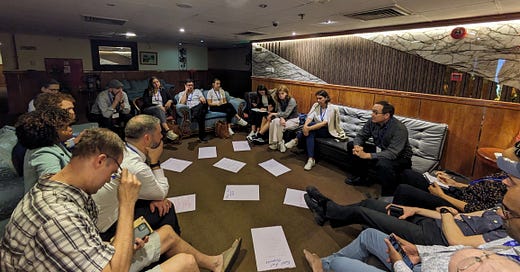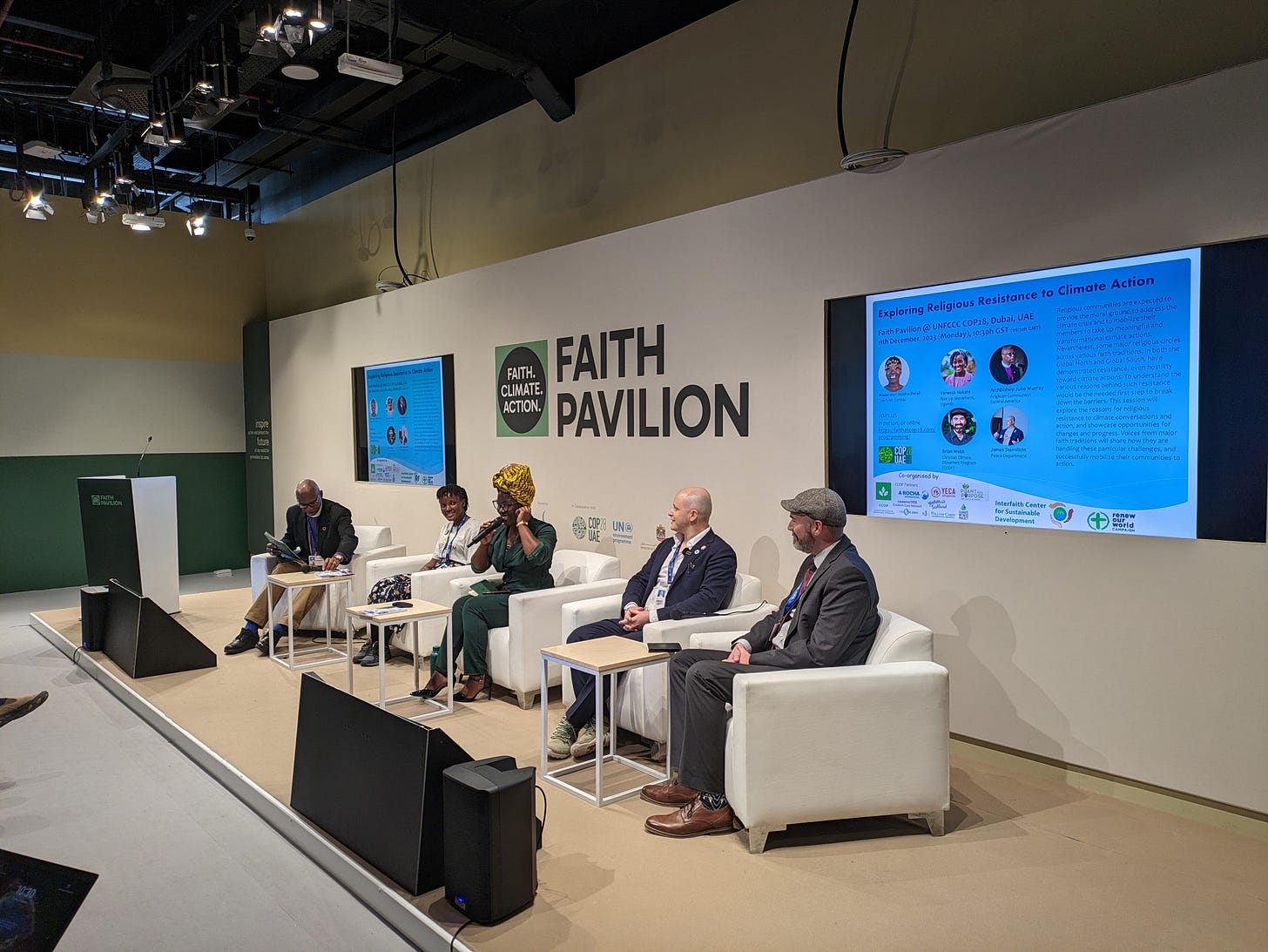Each morning at our hotel in Dubai, the CCOP leadership leads a devotional time for the group. At a meeting like COP28 (or partisan politics back in the States!) it starts to seem like the rational thing to go after the oil lobbyists with stinging rhetoric. Stick it to the man. Own the libs. Expose the fundies for the frauds they are. Etc. And I’ve heard apologists use the “speak the truth in love” verse as a license to really bring out the argumentative guns. What could be more loving than showing someone they’re wrong?!?
A guy I interviewed one time for my podcast gave a very powerful line when I asked him about reasons to be hopeful in the face of the climate crisis. He said, “God doesn’t call us to be effective, God calls us to be faithful. On our best days, that faithfulness might lead to effectiveness, but ultimately that’s not really up to us. Do your best and leave the results to God.” That has stuck with me. Aim to be faithful, not necessarily effective. Is it our job to argue OPEC out of their stranglehold on climate action, and if we don’t do that we have failed? That might be setting the bar a little too high. Instead, it is our job to be faithful, which means bearing witness to the good news. It means loving our neighbor, and loving our enemy. Love—not arguments—is what will be a conduit to change.
Our first stop at the COP today was the Faith Pavilion, because one of our own, Brian Webb, was on a panel about why religious people are so resistant to climate action.
Also on the panel was Vanessa Nakate, from Uganda. Lots of people think she has now surpassed Greta Thunberg as the most important young climate activist in the world. And she is an outspoken Christian. She started her talk with Luke 4, where Jesus reads from the scroll of Isaiah:
“The Spirit of the Lord is upon me,
because he has anointed me
to bring good news to the poor.
He has sent me to proclaim release to the captives
and recovery of sight to the blind,
to set free those who are oppressed,
to proclaim the year of the Lord’s favor.”
This is the work of climate change, she said. That sounds like speaking the truth in love.
My big accomplishment today was submitting an article to Christianity Today. I had sent them a pitch before leaving on this trip, asking if they’d consider an article on COP28 from me while in Dubai. We negotiated a bit back and forth about possible topics, and they agreed it would be a good thing for their more conservative-leaning audience. I had written most of it yesterday, and then after our devotions this morning, I reframed it a bit. The overall thrust is asking why the American church so poorly represented at COP28, and why American Christians (particularly Evangelicals) are engaged so little (or actively on the wrong side) in climate action. I tell some stories from Pacific Islanders I encountered here who are desperate to save their cultures, and do some theology, and offer a few practical steps to get more engaged as people of faith. I heard back tonight that they have accepted it and want to publish it online very quickly while the COP is still going on. I’ll maybe include a link in tomorrow’s newsletter.
The news from COP28 at the end of the day was grim. The big document that is supposed to be produced and agreed upon by all the parties does not have any new language about phasing out or even phasing down fossil fuels. It appears that the more than 2000 lobbyists from oil companies attending the COP have been successful in their attempts to thwart any meaningful progress in limiting the supply side of fossil fuels. This certainly creates a challenge in our charge this morning to love our enemies.
How do we love them? A good first step is to try to get to know and understand them. I think a key to understanding the OPEC nations and Big Oil more broadly is that there is an estimated $100 trillion worth of fossil fuel assets still in the ground. We’re asking them to leave it there. How would you feel if you knew there is a treasure buried in your back yard that would radically improve your family’s means, but everyone else was asking you not to dig it up, because it would hurt theirs? I hope you would have the virtue and character not to dig it up. But maybe you could understand how you might latch onto any shred of evidence that could possibly be interpreted as saying, “it wouldn’t really be that bad for those other people… and plus we’d try to do our part to help them out.”
The boy genius, Ender Wiggin, in the sci-fi novel Ender’s Game was tasked with defeating the aliens. The key to defeating them was to understand them. But he found that once he understood them, he no longer wanted to defeat them; he loved them. It’s a really good book.
Last piece of COP28 news: The last session today was a plenary in the big room, designed to be an update on all the progress. In the midst of it a young woman ran up to the stage with a placard, yelling for us to act now to end fossil fuels. I had just told the people I was sitting with before the session started that I’ve been amazed not to see a greater security presence in case there were protesters who would try some stunt. Once this girl ran up, there was no great rush from security the way you see it when someone runs onto a football field. The people on the stage just stopped talking and looked at her. Two security personnel walked slowly down the aisle and stood next to her. She looked at them like, “aren’t you going to do anything?” So she yelled her message again. Then they escorted her (without touching her, so far as I could see), off the stage and everyone clapped (for her or for the way it was handled?).
The speakers on the stage were unflapped. Obviously they had been prepped for just such an incident. The speaker even said, “We appreciate the enthusiasm of our young people, let’s give the young lady another round of applause”. And then the next person who spoke called it “A touching moment.” From the perspective of the organizers and speakers, they diffused that well by a kind of love for their enemy — they certainly showed respect and didn’t resort to violence.
One last thing: on the way home we stopped at the Mall of the Emirates to eat in the food court. It looks like any other high end mall you’d find in a big city, lots of shops for high-end underwear (“high-end” referring to the price of the underwear, not its architecture), shoes, and bags. But it had something I’ve not seen anywhere else, an indoor ski slope. I had heard of this but thought it was a synthetic surface of some type. But nope, they close off an area and cool it to -2 degrees Celcius (in the desert, remember), and then make artificial snow for a ski slope (complete with chair lifts) and a sled run. Crazy.
Is there a way to twist this into today’s theme of loving your enemy: if you live in the desert, is snow the enemy?? It’s late. I’m getting a little loopy. Good night from Dubai.







Hey Jim. I don't know how you have time to travel, attend gatherings and then write these daily chronicles. And then you have to go on to say you have also written an article for CT?!! Congrats. I'm really glad you will be able to reach that audience. (And, expect me to follow up with more questions down the road!)
I'm enjoying your insider's report and insights very much! Really appreciated the Luke 4 insight from Vanessa Nakate. I'm also curious about your analogy: "How would you feel if you knew there is a treasure buried in your backyard that would radically improve your family’s means?" In regards to the oil company executives, does "radically improve" mean elevating them from multi-millionaire status to multi-billionaires? I'm looking for my Christian compassion here and finding it a little scarce.